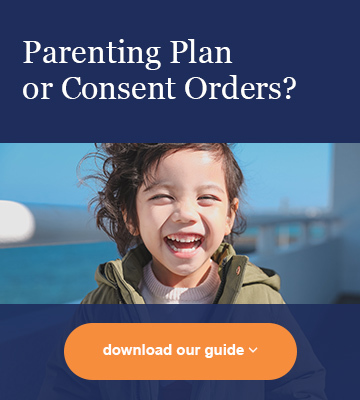
Under Australia’s Family Law Act 1975, deciding parenting issues, including where the children will live, are governed by the paramount principle of the ‘best interests’ of the child.
Primary considerations in deciding those best interests are:
- that a child can have a ‘meaningful relationship’ with both parents; and
- that a child can be free from physical or psychological harm caused by abuse, neglect or family violence.
Secondary considerations under the Act include the wishes of the children about where they want to live, the participation of each parent in decisions about the raising of the children and their commitment to maintaining them and the nature of the relationship the child may have with extended family, including grandparents.
In parenting matters, a common area of dispute occurs when one party wishes to relocate the children of the relationship to live somewhere else, such as in another city or in another State.
The inherent difficulty of these disputes is the fact that when one parent wishes to relocate the children to another State or city, it almost inevitably means the other parent will spend less time with them.
In addition to time, considerations in relocation cases can include; the parent who wishes to move has formed a new relationship with someone who lives in the proposed location, the parent may wish to move to be closer to immediate family and support and/or they have secured a better employment or study opportunity.
Under the Act, each parent is presumed to have equal and shared parental responsibility for the children, meaning both parents must be involved and agree about important decisions for the child, including where they live.
This does not mean that one parent is restricted to living where the other parent dictates. If a new residence for the child is not a significant distance from the other parent, moving house should not cause any problems. If, however, the move prevents or changes the amount of time the non-relocating parent can spend with the children, then it is significant and should not occur without consent.
Negotiating Relocation
Ideally, parties will come together to discuss and resolve how a proposed relocation will impact the best interests of the child. During their negotiations, the focus should be on how to maintain and facilitate the child’s relationship with the non-relocating parent.
Matters to be discussed may include; the amount of time the children will spend with the non-relocating parent, the costs of the children travelling to spend time with the non-relocating parent, and how communication between the children and the non-relocating parent can be achieved and how often and more.
The final arrangement can be reached informally between the parties or negotiated through a family dispute resolution process such as mediation. By either method, the agreement can be formalised through a parenting plan or by entering into consent parenting Orders. Both methods will avoid the inevitable cost, time and stress involved in Court proceedings.
Because relocation of children is generally unwanted by the non-relocating parent, applications for relocation, and other parenting Orders, can be made to the Federal Circuit and Family Court of Australia. In those circumstances, the Court will be asked to make Orders about the children’s living arrangements and how much time they spend with each parent. The Court will make its decision either to permit or prevent one parent’s relocation with children based on what is in the best interests of the children.
Rosa’s Case
When considering a relocation, some of the factors which help the Court determine what Orders should be made in a particular situation were most notably expressed in the case of MRR v GR [2010], known as ‘Rosa’s Case’.
In Rosa’s case, the mother wanted to move with the party’s 5-year-old child, (back) to Sydney from Mt Isa. She was initially prevented from leaving with the child after the father objected. The Court, and the Family Consultant, took the view that it was in the child’s best interests that the mother remains in Mt Isa so that there could be the opportunity for equal time with the child. On appeal to the High Court of Australia, the mother’s circumstances were more extensively examined. The factors that were considered included; that while in Mt Isa she was living in a caravan park with little prospect for more suitable accommodation, there were limited employment opportunities in Mt Isa and, the situation that she and the child were in was adversely affecting her mental health. This was compared to Sydney where she had, not only greater work opportunities with more flexible hours, but also had access to family support. The Court ordered the mother to be allowed to relocate because improving her personal circumstances were also in the best interests of the children.
The decision has relevance for many relocation cases, emphasising that the individual circumstances of each parent will be considered before determining whether it is, or isn’t, in the best interests of a child to move away.
Does the parent who has primary care of the children have additional family and community support at the place they plan to move to? Do they have better employment prospects? Is there any family violence or neglect which supports the decision of one parent to move to a new location?
These considerations are complicated where the non-relocating parent has equal time and care for the children and is deeply enmeshed in their lives, or where the children oppose relocation despite being mostly cared for by the parent who wishes to move.
Consequences of Unilateral Relocation
Unilateral relocation is when one parent relocates with the children without the other party’s consent or without a Court Order.
If relocating the existing Court Orders cannot be followed, that parent will be contravening (breaching) the Orders. Contravening an Order can have serious consequences, including fines and imprisonment in extreme cases (see as an example the case of Short & Trevilian (Contempt and Contraventions) [2008])
Some parenting plans and parenting Orders expressly prohibit one parent from moving the children a long distance away from the other parent. If one party unilaterally relocates the children without varying the agreement or obtaining Orders, they will be in breach of their obligations.
One common consequence of unilateral relocation is that the Court may order the child to be returned until the case has reached an outcome.
Naturally, existing parenting Orders can be varied by consent or by a parent applying to the Court to either relocate a child or prevent the relocation of a child, with any new Orders overriding the existing parenting arrangements.
Overseas Relocation
A parent is not permitted to relocate a child who is an Australian resident overseas without the permission of the other parent, even for a brief holiday. With some exceptions, a child will only be issued an Australian passport with the written consent of each person who has parental responsibility for that child.
If a party is concerned the other parent may try and relocate a child overseas without their consent, there are steps that can be taken.
They can prevent a passport from being issued by lodging a Child Alert Request with the Australian Passport Office. If the child already has a passport, a party can apply to the Court for the child’s passport, or the other parent’s passport, to be surrendered to the Court. Other orders that can be applied to prevent a child from leaving the country include; a Child Alert Order and an Order that their name is placed on the Airport Watch List to prevent them from departing Australia.
Seek Expert Legal Advice
The issue of one parent relocating a significant distance away from the other parent with their children is a particularly difficult one in Family Law. The situation can lead to highly emotive reactions when the non-relocating parent realises time spent with the children could be significantly reduced.
The guidance of expert Family Law professionals is essential in such cases, whether you are the parent seeking to relocate or the parent trying to prevent the move.
At Delaney & Delaney, we have highly experienced legal practitioners who understand the challenges for families involved in relocation decisions. Call us today for compassionate and understanding advice on your situation.

